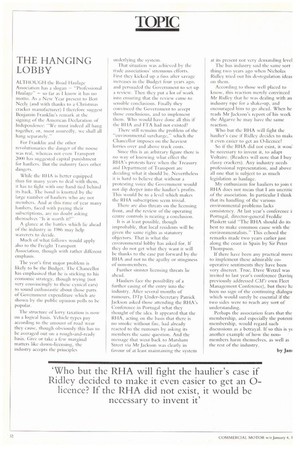THE HANGING LOBBY
Page 32

If you've noticed an error in this article please click here to report it so we can fix it.
ALTHOUGH the Road Haulage Association has a slogan — "Professional Haulage" — so far as I know it has no motto. As a New Year present to Bert Neely (and with thanks to a Christmas cracker manufacturer) I therefore suggest Benjamin Franklin's remark at the signing of the American Declaration of Independence: "We must indeed all hang together, or, most assuredly, we shall all hang separately."
For Franklin and the other revolutionaries the danger of the noose was real, whereas not even Transport 200(i has suggested capital punishment for hauliers. 13m the industry flees other dangers.
While the RI IA is better equipped than for many years to deal with them, it has to tight with one hand tied behind its hack. The bond is knotted by the large number of hauliers who are not immbers. And at this time of year many hauliers, faced with paying their subscriptions, are no doubt asking themselves "Is it worth it?'' A glance at the battles which lie ahead of the industry in 1986 may help waverers to decide.
Much of what follows would apply also to the Freight Transport Association, though with rather chili:rem emphasis.
The year's first major problem is likely to be the Budget. The Chancellor has emphasised that he is sticking to his economic strategy, though trying (not very convincingly to these cynical ears) to sound enthusiastic about those parts of Government expenditure which are shown by the public opinion polls to be popular.
The structure of lorry taxation is now on a logical basis. Vehicle types pay according to the amount of road wear they cause, though obviously this has to be averaged out on a rough-and-ready basis. Give or take a few marginal matters like down-licensing, the industry accepts the principles underlying the system.
That situation was achieved by the trade associations' strenuous efforts. First they kicked up a fuss after savage increases in the Budget four years ago, and persuaded the Government to set up a review. Then they put a lot of work into ensuring that the review came to sensible conclusions. Filially they convinced the Government to accept those conclusions, and to implement them. Who would have done all this if the RI IA and FTA had not existed?
There still remains the problem of the "environmental surcharge," which the Chancellor imposes on the heaviest lorries over and above track costs.
Since this is an arbitrary figure there is no way of knowing what effect the RIA's protests have when the Treasury and Department of Transport are deciding what it should be. Nevertheless it is hard to believe that without a protesting voice the Government would not dip deeper into the haulier's profits. This would be to a level which makes the RI IA subscription seem trivial.
There are also threats on the licensing front, and the review of the operating centre controls is nearing a conclusion.
It is at least possible, though improbable, that local residents will be given the same rights as statutory objectors. That is what the environmental lobby has asked for. If they do not get what they want it will be thanks to the case put forward by the RHA and not to the apathy or stinginess of non-members.
Further sinister licensing threats lie ahead.
Hauliers face the possibility of a further easing of the entry into the industry. After several months of rumours, IYFp Under-Secretary Patrick Jackson asked those attending the RHA's Conference in Portugal what they thought of the idea. It appeared that the RI IA, acting on the basis that there is no smoke without fire, had already reacted to the rumours by asking its members the same question. And the message that went back to Marsham Street via Mr Jackson was clearly in favour of at least maintaining the system at its present not very demanding level The bus industry said the same sort thing two years ago when Nicholas Ridley tried out his de-regulation ideas On them.
According to those well placed to know, this reaction merely convinced Mr Ridley that he was dealing with an industry ripe for a shake-up, and encouraged him to go ahead. When he reads Mr Jackson's report of his week the Algarve he may have the same reaction.
Who but the RHA will fight the haulier's case if Ridley decides to mak( it even easier to get an 0-licence?
So if the RHA did not exist, it woul be necessary to invent it, to adapt Voltaire. (Readers will note that I buy classy crackers). Any industry needs professional representation, and above all one that is subject to as much legislation as haulage.
My enthusiasm for hauliers to join RHA does not mean that I am uncritic of the association. In particular I think that its handling of the various environmental problems lacks consistency. At last year's conference ii Portugal, director-general Freddie Plaskett said "The RHA should do its best to make common cause with the environmentalists." This echoed the remarks made two years earlier just along the coast in Spain by Sir Peter Thompson.
If there have been any practical move to implement these admirable cooperative sentiments they have been very discreet. True, Dave Wetzel was invited to last year's conference (havini previously addressed CM's own Fleet Management Conference), but there ha been no sign of the continuing dialogui which would surely be essential if the two sides were to reach any sort of understanding.
Perhaps the association fears that the membership, and especially the potenti membership, would regard such discussions as a betrayal. If so this is y( another example of how the nonmembers harm themselves, as well as the rest of the industry.
by Jam


































